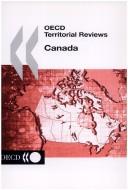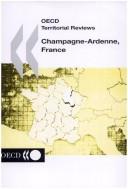| Listing 1 - 3 of 3 |
Sort by
|

ISBN: 1280006072 9786610006076 9264176306 9264198326 9789264176300 Year: 2002 Publisher: Paris : OECD Publishing,
Abstract | Keywords | Export | Availability | Bookmark
 Loading...
Loading...Choose an application
- Reference Manager
- EndNote
- RefWorks (Direct export to RefWorks)
OECD's Territorial Review of Canada. It finds that Canada is composed of three macroregions: a southern ribbon with all the important metropolitan areas, a zone of rural and non-metropolitan adjacent regions and a sub-continent of remote northern territories. Disparities between these macroregions persist and may even be growing. Opportunities for growth are lost because of these imbalances and also because specific regional advantages are not fully tapped. In many regions, weak local governance is hindering the emergence of local grass-roots projects, diffusion of R&D results to SMEs is slow and dialogue between higher education institutions and firms is poor. This report underlines the need for federal agencies and sectoral departments to continuously assess the consistency of their policies with regard to the three macroregions in order to enhance territorial cohesion and better tailor programmes to local conditions. More federal involvement in metropolitan issues notably through negotiated planning could help to institutionalise and strengthen urban policies. This report also emphasises the significant overhauling of rural policies that took place recently. It underlines that in certain areas such as amenities a strategic approach is still to be defined. Resolving governance issues is a priority in the north.
Canada -- Economic conditions -- 1991-. --- ocial planning --Canada. --- Social planning --Canada. --- Sustainable development -- Canada. --- Sustainable development --- Social planning --- Business & Economics --- Economic History --- Social development planning --- Planning --- Economic history. --- Canada --- Economic conditions --- Economic policy. --- History, Economic --- Economics

ISBN: 9264175954 9264198008 Year: 2002 Publisher: Paris : OECD Publishing,
Abstract | Keywords | Export | Availability | Bookmark
 Loading...
Loading...Choose an application
- Reference Manager
- EndNote
- RefWorks (Direct export to RefWorks)
The Champagne-Ardenne region in the north-east of France enjoys comparative advantages in a number of sectors, including mechanics, metalworking, packaging and agriculture, and of course Champagne. Although it still ranks fifth among French regions in terms of GDP/capita, Champagne-Ardenne lost ground during the recession of the early 1990s. This report analyses the strategy conducted by the Regional Council to strengthen the catching-up process and diversify the regional economy. It insists on the need to focus on two prime engines of growth: entrepreneurship and foreign direct investment. Moreover, increasing the competitiveness of the region calls for special efforts to help Champagne-Ardenne move towards more knowledge-based economic activities, to stimulate research and to encourage SMEs to network and innovate. While a better balance between agricultural policies and rural policies needs to be found, the region also has an important role to play in fighting urban decay - Champagne-Ardenne is one of the regions in France with the largest proportions of total population living in sensitive urban zones.The report also suggests that the potential for urban development could be enhanced by encouraging co-operation among cities and fostering the establishment of urban networks.
Champagne-Ardenne (France) -- Economic conditions. --- Social planning -- France -- Champagne-Ardenne. --- Sustainable development -- France -- Champagne-Ardenne. --- Sustainable development --- Social planning --- Champagne-Ardenne (France) --- Economic conditions. --- Economic policy. --- Social development planning --- Planning --- Development, Sustainable --- Ecologically sustainable development --- Economic development, Sustainable --- Economic sustainability --- ESD (Ecologically sustainable development) --- Smart growth --- Sustainable economic development --- Economic development --- Environmental aspects --- Champagne-Ardenne, France --- Champagne (France : Province) --- Grand Est (France)
Book
ISBN: 1455275182 1452712611 1283565234 9786613877680 1452753776 Year: 2002 Publisher: Washington, D.C. : International Monetary Fund,
Abstract | Keywords | Export | Availability | Bookmark
 Loading...
Loading...Choose an application
- Reference Manager
- EndNote
- RefWorks (Direct export to RefWorks)
This 2002 Article IV Consultation highlights that the real GDP of Tunisia grew by 5 percent in 2001 compared with 4.7 percent in 2000, despite a contraction in agricultural output of 1.5 percent caused by a third consecutive year of drought. Activity was particularly robust in the mechanical–electrical industry, which grew by 14 percent, and the textile industry, which expanded by 12 percent. The authorities now face the challenge of reining in strong demand, which has put pressures on the external position and lowered foreign exchange reserves.
Banks and Banking --- Exports and Imports --- Macroeconomics --- Money and Monetary Policy --- Foreign Exchange --- International Lending and Debt Problems --- Banks --- Depository Institutions --- Micro Finance Institutions --- Mortgages --- International Investment --- Long-term Capital Movements --- Monetary Policy, Central Banking, and the Supply of Money and Credit: General --- Comparison of Public and Private Enterprises and Nonprofit Institutions --- Privatization --- Contracting Out --- Development Planning and Policy: Trade Policy --- Factor Movement --- Foreign Exchange Policy --- Current Account Adjustment --- Short-term Capital Movements --- International economics --- Banking --- Monetary economics --- Currency --- Foreign exchange --- External debt --- Commercial banks --- External position --- Credit --- Financial institutions --- Exchange rate policy --- Current account deficits --- Balance of payments --- Debts, External --- Banks and banking --- International finance --- Tunisia
| Listing 1 - 3 of 3 |
Sort by
|

 Search
Search Feedback
Feedback About
About Help
Help News
News